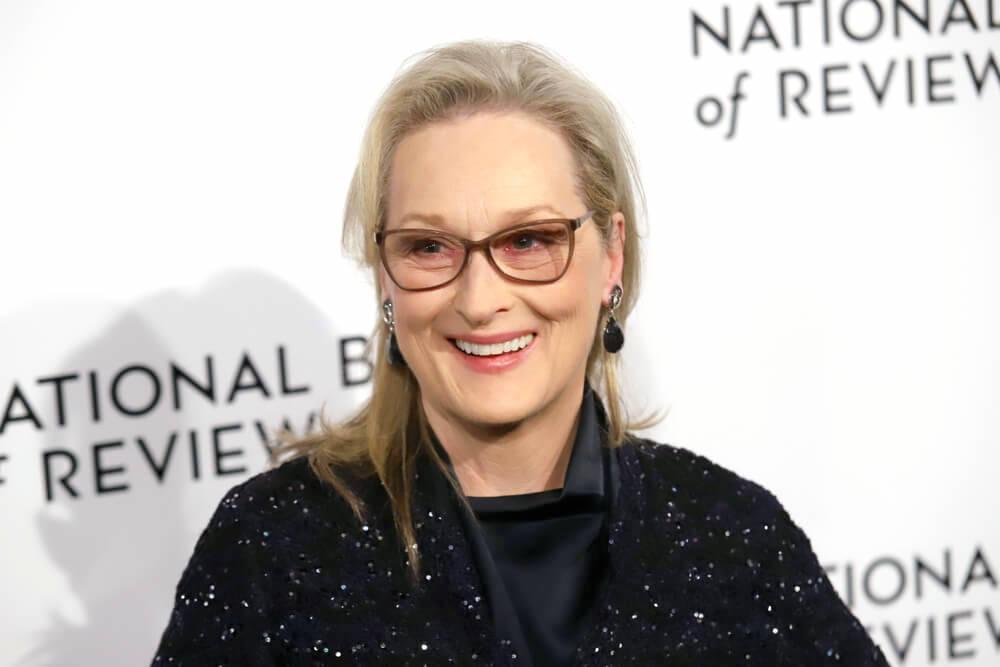“We build an arc that’s a rough sketch with a pencil, and when she’s through with it, it’s a beautiful oil painting.” That’s how Post Writers describe what it’s like working with Meryl Streep. Nicole Kidman called Streep “a master.” Even the great Shirley Maclaine admitted to having to cop some of Streep’s technique when working with her on “Postcards from the Edge.”
Most people agree. Meryl Streep makes acting seem as natural as breathing. It’s apparent in the way she makes eye contact with the other actors, the way she sets up the lines, and the way she interprets the script. Meryl is a team player on the set, and every movie she makes is better for having her in it.
Mary Louise Streep was born on June 22, 1949, in Summit, New Jersey. She cut her teeth acting on Broadway before making her film debut in the 1970’s and has gone on to become what many critics refer to as “the best actress of her generation.” The awards and nominations she has received in her lifetime are too many to mention, the films speak for themselves. Here are some of the best films of Meryl Streep’s career.
Kramer vs. Kramer
Before 1979, divorce was a dirty word. Married couples honored their vows, no matter how miserable their marriages were. They had made a promise before God, and they were bound to keep it.
Soon it was apparent that there were alternatives. Contracts could be broken, and the marriage contract was included. Although divorce became more popular, it remained a controversial issue. No one wanted to confront it or explore it, however, Meryl Streep was never one to back down from a confrontation.
“Kramer vs. Kramer” was a trailblazing movie for its time because it dealt with the issue of divorce realistically and candidly.
The movie stars Meryl Streep and Dustin Hoffman as Ted and Joanna Kramer. Joanna comes home one day with the news that she is leaving Ted in order to “find herself.” Ted is crushed. He has to deal with Billy missing his mother and an increased workload. Despite his hardships, Ted finds a way to cope, and Ted and Billie form a strong bond without Joanna’s presence.
Fifteen months later, Joanna returns. She wants Billie back and is willing to take Ted to court over it. A brutal custody battle ensues with the lawyers unleashing character assassinations on both parties that neither are prepared for. Although the custody of Billie is awarded to Joanna, it seems there is no real winner.
“Kramer and Kramer” was revolutionary for the way it challenged the notions of whether or not a child really belongs with its mother. Both Hoffman and Streep’s performances earned them Academy Awards. The film is just one example of Meryl Streep’s willingness to take on controversy, even if it means playing the bad guy.
Sophie’s Choice
From the title, you might think that Sophie’s choice is a movie of hope, of a woman determining her own future, but in the movie, “Sophie’s Choice” is a hopeless one and one no woman should have to make.
The movie begins in 1947 in Brooklyn where Polish immigrant Sophie Zawistowski lives with her abusive lover, Nathan. There she befriends a young writer named Stingo.
As Sophie and Stingo form a bond, Sophie begins to reveal details about the horrors of her life before coming to the US. He learns that her husband and father had been killed in a German Work Camp and that she herself had interned at Auschwitz. She tells him of how one of her friends had asked her to translate some papers for the Gestapo, but she had refused, fearing that it might bring harm upon herself and her two children: a boy and a girl. Two weeks later, she and her children are sent to Auschwitz.
It is then that the movie reaches its most shocking and cruel portrayal of the darkness of the human spirit. Stingo learns that upon Sophie’s arrival at Auschwitz, she is told that she must choose between her children. One would be gassed, the other would be sent to a labor camp. In order to avoid losing both children, Sophie chooses her girl, Eva to die, and her boy Jan to be sent to a labor camp.
After her confession, she returns to Nathan and the two commit suicide. Was death also Sophie’s choice or was it the only choice that she truly made on her own?
Meryl Streep won the Academy Award for Best Actress in this film. It is one of her most awe-inspiring and provocative performances.
Silkwood
Cher and Meryl! In 1983, they were the two most influential women in the world. With these two leading ladies in the spotlight, this movie could either end in an ego-fueled disaster or an unforgettable triumph. With actresses of that caliber, failure is not an option.
Silkwood is the true story of Karen Silkwood, played by Meryl Streep. Karen is a worker at the Kerr-McGee Cimarron Fuel Fabrication Site. Her job involves making plutonium fuel rods for nuclear reactors. The threat of radiation is a condition of the job.
Motivated by what she sees as injustice, Silkwood becomes an activist spreading the word about the company’s lack of compassion for human life. Conditions worsened when the company falls behind on a major contract and workers are forced to put in overtime. Silkwood travels to Washington, D.C to testify in front of the Atomic Energy Commission. However, the people she interacts with there seem more interested in generating publicity than in solving the problems.
Soon Silkwood gets the feeling that she is being put on the offensive. The company is blaming her for the accident. When she finally feels she has sufficient evidence, she arranges a secret meeting with a New York Times Reporter.
As the movie ends, we see Silkwood in her car on the way to the meeting. She sees approaching lights in her rearview mirror and the scene fades on her fatal car crash.
The Deer Hunter
They don’t make movies like “The Deer Hunter” anymore. Neither do they make actors like Robert DeNiro, Christopher Walken, and Meryl Streep. They were the actor’s actors, the ones for whom playing a role meant becoming the character, where being pretty had nothing to do with making a movie and if life was ugly then so were they.
“The Deer Hunter” is a movie about a trio of Russian American steelworkers played by Robert DeNiro, Christopher Walken, and John Savage. It takes place in the year of 1967, with the three ready to embark on marriage and military service. Meryl plays a supporting role as Linda, Walken’s girlfriend.
“Deer Hunter” is a very disturbing movie. It chronicles the time that the three men spent in Vietnam and the experiences they had there with constant allusions to the night of deer hunting the men spent before their embarkation. It raises questions about what it means to be the prey and what it means to be the predator.
While the role Meryl plays in the movie may not be central to the movie itself, it was central to her career. Robert DeNiro spotted her in the Stage production of “The Cherry Orchard” and suggested her for the role.
She agreed to stay in the role as the stock girlfriend so she could stay on with actor John Cazale, with whom she was in a relationship at the time. Scenes with Cazale had to be shot first because of his lung cancer diagnosis. He never lived to see the film in its completion.
The Devil Wears Prada
Not many women get to play the devil and even less get to play the devil in the guise of Anna Wintour, but then again, not many women are Meryl Streep.
“The Devil Wears Prada” is a departure for Meryl. Here we see her in a comedic light. Although the character of Miranda Priestly is based on a real person, the character in the movie seems almost unreal in her insensitivity to others, and Meryl plays her wickedly well.
This devilishly good film stars Anne Hathaway as Andy, a girl from a small town with big dreams in the big city. Despite her inexperience with the fashion industry, she is assigned a job of playing personal assistant to Miranda Priestly, the infamous editor-in-chief of Runway magazine, but even the most experienced fashionista couldn’t possibly be prepared for the wrath of Miranda Priestly.
While Andy fumbles through her life as Miranda’s new assistant, she is faced with the chilly receptions from her new coworkers but manages to befriend the amiable Nigel, who helps to raise her fashion IQ to a respectable level. Although her new wardrobe may earn her nods from her colleagues, it does nothing to elevate her in the eyes of her boss. Throughout the movie, Miranda never softens and continues to humiliate Andy and make her life as miserable as possible.
When it comes to playing a person so despicable, most of us wouldn’t have thought Meryl had it in her, but anyone who has seen the movie knows that Meryl can play naughty just as well as she plays nice. It won Meryl the Golden Globe for Best Actress in a Comedy or A Musical and won our hearts in a big way.
Doubt
From devil to nun, there is no role that Meryl can’t slip into seamlessly, and there is no doubt that Meryl has no problem doing it the movie, “Doubt.”
Meryl plays Sister Aloysius, a fire and brimstone nun who believes that no deed, good or bad should go unpunished and that she’s all too happy to mete out that punishment if necessary. In this case, Father Brenden Flynn, played by Philip Seymour Hoffman, is on the receiving end of Meryl’s punishment.
The year is 1964, Father Brendan Flynn is a priest at a Catholic church in The Bronx, New York. When first seen, Flynn is giving a sermon on the subject of doubt, noting that like faith, doubt can be a uniting force.
Sister Aloysius becomes concerned when a young nun reports suspicious behavior on the part of Father Flynn with regards to the school’s only black student, Donald Miller. The young Sister James has noticed that Father Flynn has been devoting a suspicious amount of time with Donald, and the activities are questionable.
When the Father asks that the relationship is left as a private matter, Sister Aloysius takes that as a signal that the matter needs to be further explored. This. Sister Aloysius on a crusade against the Father and will stop at nothing until she sees what she defines as justice done.
When the movie ends, Sister Aloysius more or less gets what she is after but is not sure if it was worth the price. She admits to having lied about the Father’s past in order to build her case against him and is now faced with the moral guilt that will lie heavily on her soul. The last scene shows her sitting with Sister James in a park pondering over the veracity of her actions, concluding with, “I have such… doubts.”
Julie and Julia
Let’s end on a high note, shall we? “Julie and Julia” is an absolute lark of a movie with Streep’s portrayal of Julia Child as the icing on the cake.
Julie, played by Amy Adams, is a young New York writer assigned to the depressing task of answering phone calls from the families of 9/11 victims concerning controversial plans for the rebuilding of the World Trade Center. She seeks solace by devoting herself to a blog, chronicling her mission to cook every recipe in Julia’s “Mastering the Art of French Cooking in One Year.”
In the film, we see Julia’s triumphs mirroring Julie’s triumphs, but the biggest triumph here is Meryl’s portrayal of Julia Child. According to Salon Magazine’s Stephanie Zacharek, “Steep isn’t playing Julia Child here, but something more elusive and truthful – she’s playing our idea of Julia Child.”
That’s Meryl through and through – always giving the people what they want.
*Featured image credit: Meryl Streep attends the National Board of Review Awards at Cipriani on January 9, 2018, in New York | © JStone / Shutterstock.com





Leave A Comment